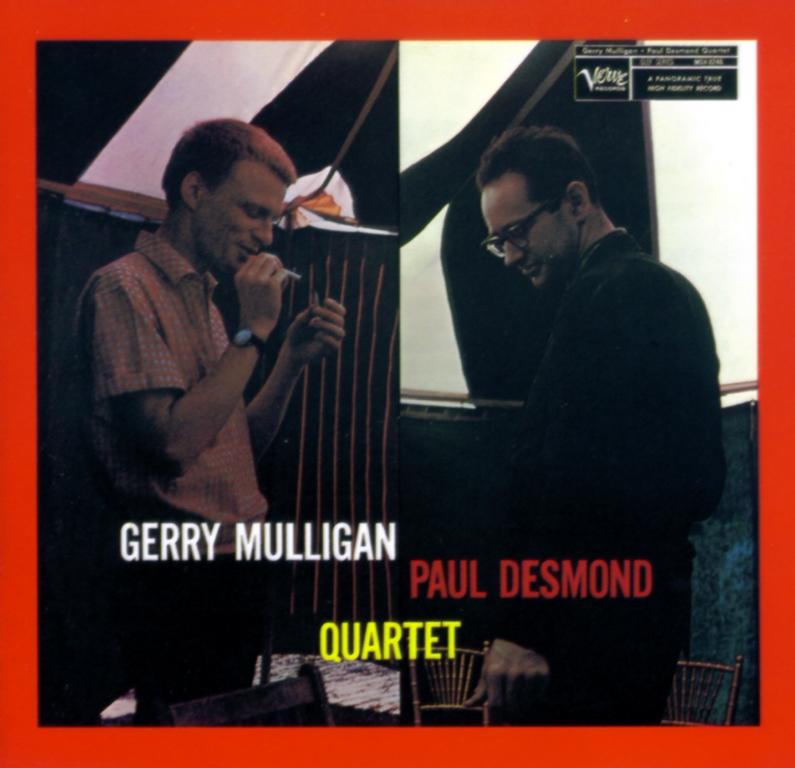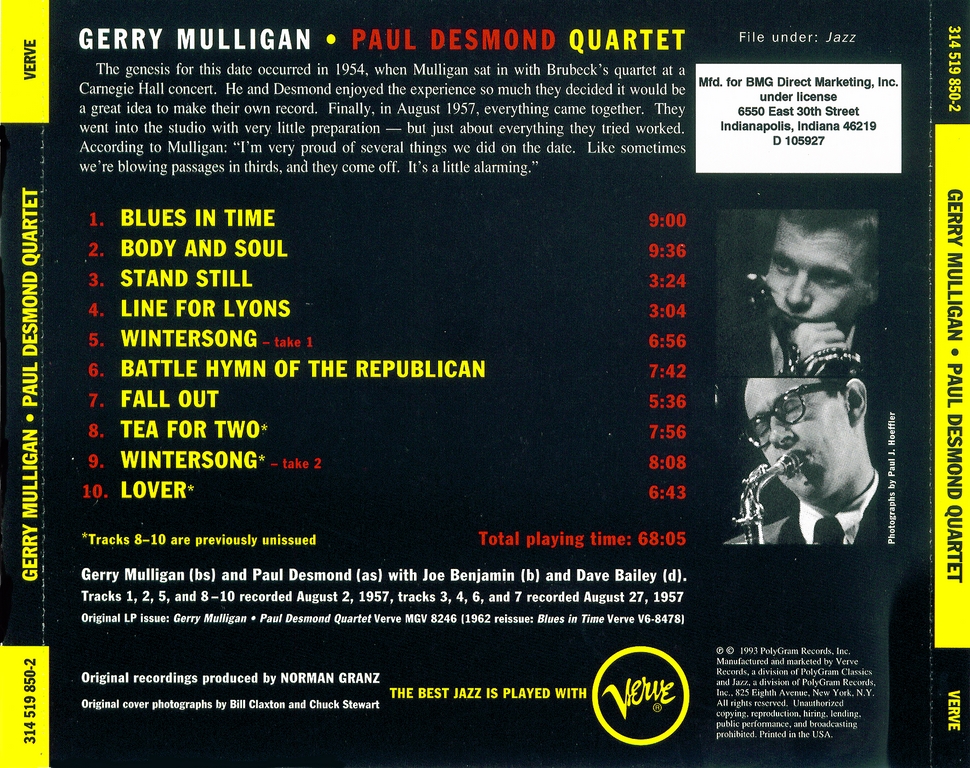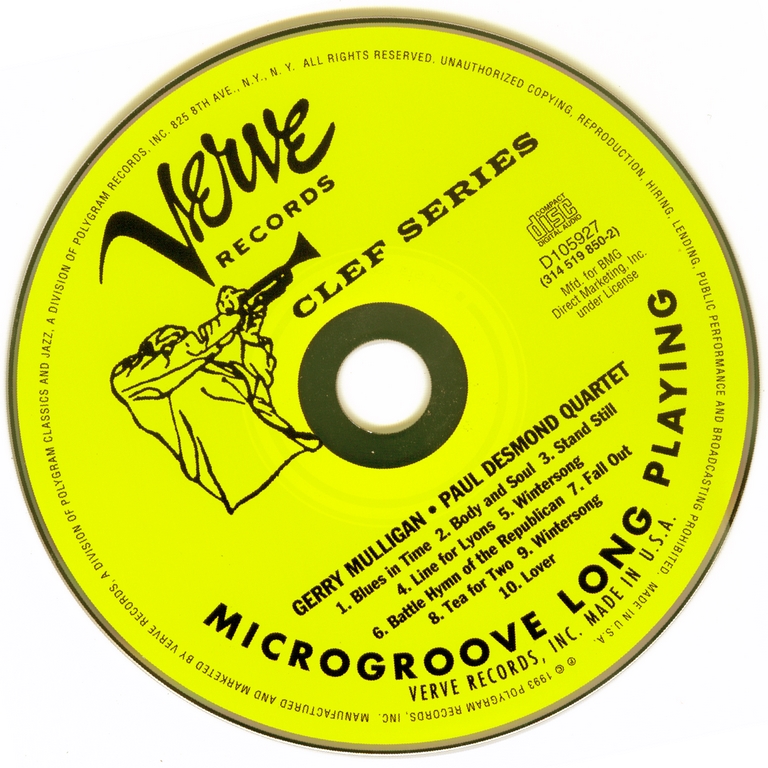


BOOKLET
Gerry Mulligan & Paul Desmond – Quartet (1994) [FLAC]
Original label Verve
Recorded August 2 & August 27, 1957
LP Release was Gerry Mulligan Meets Paul Desmond
Reissue to CD, Street Date 1994
Original recordings produced by Norman Granz
Personnel:
Gerry Mulligan Bari sax
Paul Desmond Alto sax
Joe Benjamin Bass
Dave Bailey Drums
Track List:
01 Blues in Time 9:00
02 Body and Soul 9:36
03 Stand Still 3:24
04 Line for Lyons 3:04
05 Wintersong-Take 1 6:56
06 Battle Hymn of the Republican 7:42
07 Fall Out 5:36
08 Tea for Two 7:56
09 Wintersong-Take 2 808
10 Lover 6:43
Review by Ken Dryden, AMG 4 1/2 stars
This is the first recorded collaboration of baritone saxophone great Gerry Mulligan and the witty alto saxophonist Paul Desmond. Despite hardly any preparation for these recording sessions, the two men complement one another’s playing beautifully, as both of them were highly melodic improvisers. Desmond brought three originals to the sessions: the driving “Blues in Time,” the soft ballad “Wintersong” (which is based on the chord changes to “These Foolish Things”), and “Battle Hymn of the Republican” (which is actually a complex reworking of “Tea for Two”). Mulligan’s contributions include his earlier hit “Line for Lyons,” “Stand Still” (based on “My Heart Stood Still”), and the Latin-tinged “Fall Out” (taken from “Let’s Fall in Love”). Mulligan was clearly annoyed when told that three unissued tracks (“Tea for Two,” “Lover,” and an alternate take of “Wintersong”) had been added to the CD reissue, but was clearly amused at the accidental and unlisted first take of “Lover,” which falls apart after a minute-and-a-half and is followed by some discussion. Bassist Joe Benjamin and drummer Dave Bailey provide excellent rhythmic support throughout this highly recommended CD.
Biography by Scott Yanow, AMG
The most famous and probably greatest jazz baritonist of all time, Gerry Mulligan was a giant. A flexible soloist who was always ready to jam with anyone from Dixielanders to the most advanced boppers, Mulligan brought a somewhat revolutionary light sound to his potentially awkward and brutal horn and played with the speed and dexterity of an altoist.
Mulligan started on the piano before learning clarinet and the various saxophones. His initial reputation was as an arranger. In 1944 he wrote charts for Johnny Warrington’s radio band and soon was making contributions to the books of Tommy Tucker and George Paxton. He moved to New York in 1946 and joined Gene Krupa’s Orchestra as a staff arranger; his most notable chart was “Disc Jockey Jump.” The rare times he played with Krupa’s band was on alto and the same situation existed when he was with Claude Thornhill in 1948.
Gerry Mulligan’s first notable recorded work on baritone was with Miles Davis’ Birth of the Cool nonet (1948-50) but once again his arrangements (“Godchild,” “Darn That Dream” and three of his originals “Jeru,” “Rocker” and “Venus de Milo”) were more significant than his short solos. Mulligan spent much of 1949 writing for Elliot Lawrence’s orchestra and playing anonymously in the saxophone section. It was not until 1951 that he began to get a bit of attention for his work on baritone. Mulligan recorded with his own nonet for Prestige, displaying an already recognizable sound. After he traveled to Los Angeles, he wrote some arrangements for Stan Kenton (including “Youngblood,” “Swing House” and “Walking Shoes”), worked at the Lighthouse and then gained a regular Monday night engagement at the Haig. Around this time Mulligan realized that he enjoyed the extra freedom of soloing without a pianist. He jammed with trumpeter Chet Baker and soon their magical rapport was featured in his piano-less quartet. The group caught on quickly in 1952 and made both Mulligan and Baker into stars.
A drug bust put Mulligan out of action and ended that quartet but, when he was released from jail in 1954, Mulligan began a new musical partnership with valve trombonist Bob Brookmeyer that was just as successful. Trumpeter Jon Eardley and Zoot Sims on tenor occasionally made the group a sextet and in 1958 trumpeter Art Farmer was featured in Mulligan’s Quartet. Being a very flexible player with respect for other stylists, Mulligan went out of his way to record with some of the great musicians he admired. At the 1958 Newport Jazz Festival he traded off with baritonist Harry Carney on “Prima Bara Dubla” while backed by the Duke Ellington Orchestra, and during 1957-60 he recorded separate albums with Thelonious Monk, Paul Desmond, Stan Getz, Ben Webster and Johnny Hodges. Mulligan played on the classic Sound of Jazz television special in 1958 and appeared in the movies I Want to Live and The Subterraneans.
During 1960-64 Mulligan led his Concert Jazz Band which gave him an opportunity to write, play baritone and occasionally double on piano. The orchestra at times included Brookmeyer, Sims, Clark Terry and Mel Lewis. Mulligan was a little less active after the big band broke up but he toured extensively with the Dave Brubeck Quartet (1968-72), had a part-time big band in the 1970s (the Age of Steam), doubled on soprano for a period, led a mid-’70s sextet that included vibraphonist Dave Samuels, and in 1986 jammed on a record with Scott Hamilton. In the 1990s he toured the world with his excellent “no-name” quartet and led a “Rebirth of the Cool Band” that performed and recorded remakes of the Miles Davis Nonet classics. Up until the end, Gerry Mulligan was always eager to play.
Among Mulligan’s compositions were “Walkin’ Shoes,” “Line for Lyons,” “Bark for Barksdale,” “Nights at the Turntable,” “Utter Chaos,” “Soft Shoe,” “Bernie’s Tune,” “Blueport,” “Song for Strayhorn,” “Song for an Unfinished Woman” and “I Never Was a Young Man” (which he often sang). He recorded extensively through the years for such labels as Prestige, Pacific Jazz, Capitol, Vogue, EmArcy, Columbia, Verve, Milestone, United Artists, Philips, Limelight, A&M, CTI, Chiaroscuro, Who’s Who, DRG, Concord and GRP.
Biography by Thom Jurek, AMG
Paul Desmond is widely recognized for his genius as a melodic improviser and as the benchmark of cool jazz sax players. His warm, elegant tone was one that he admittedly tried to make sound like a dry martini. He and Art Pepper were virtually the only alto players of their generation not directly influenced by Charlie Parker. Desmond was influenced by Lester Young, but took it further, into melodic and harmonic worlds never before traveled by reedmen especially in the upper registers. Desmond is best known for his years with the Dave Brubeck Quartet (1959-1967) and his infamous composition “Take Five.” He met Brubeck in the late ’40s and played with his Octet. The Quartet formed toward the end of 1950 and took final shape with Eugene Wright and Joe Morello a few years later. Jazz at Oberlin and Take Five were considered essential purchases by college students of the era, but Jazz Impressions of Japan was its most innovative recording. Desmond played his loping, slow, ordered, and intricate solos in direct contrast to the pianist’s obsession with large chords, creating a myriad of textures for melodic and rhythmic counterpoint unlike any heard in jazz. His witty quotations from musicals, classical pieces, and folk songs were also a watermark of his artistry. When the Quartet split in 1967, Desmond began an intermittent yet satisfying recording career. It included dates with Gerry Mulligan for Verve, various sessions with Jim Hall, and a concert with the the Modern Jazz Quartet. He played his last gigs with the Brubeck Quartet at reunions before dying of lung cancer. Desmond’s recordings for RCA have gotten box-set treatment and Mosaic issued one of the complete sessions with Hall. There are also reissues from A&M and CTI, though recordings on Artist House and Finesse remain regrettably out of print.
My note: These are my favorite baritone and alto sax players of all time. This album is wonderful, Paul plays in a different mode than when he played with Brubeck, he’s much more ‘on’ and Gerry is his usual ebullient self. Gerry makes that brute of a baritone sound so light and nimble, Paul with his beautiful tone and the two of them weaving in and out around each other makes for good listening. I would not call this a structured session. Originally on LP as Gerry Mulligan Meets Paul Desmond, this is the reissue CD with 3 bonus tracks.
